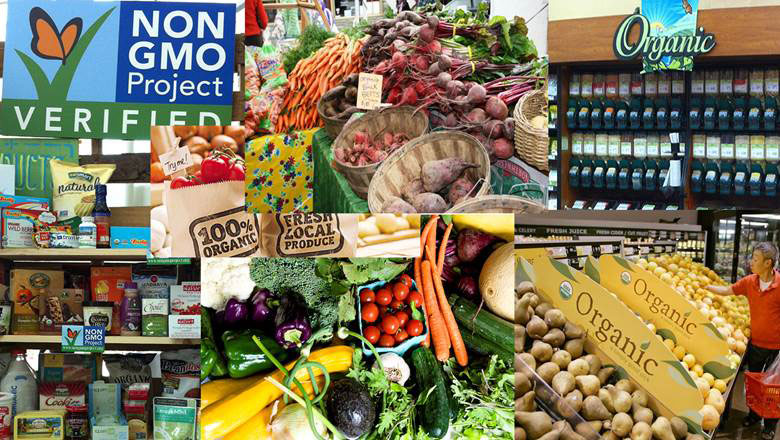While GM labelling is slowly gaining ground, the Non-GMO, GM-Free, and Organic labels are enjoying great success; the tide turns against GMOs in the USA Dr. Mae-Wan Ho

Connecticut Governor Dannel Malloy signed the first GMO labelling law in the US in December 2013, which was approved by voters back in June. But it will not come into effect unless at least 4 other neighbouring states in the region with a combined population of no less than 20 million approve similar acts. So far, Connecticut has found allies in only one adjacent state [1].
For voters in Maine, the second state to have passed a very similar law in a region that includes Massachusetts, New Hampshire, New Jersey, New York, Rhode Island and Vermont, three other states must approve the same law before it comes into effect. Surveys have found 80 to 95 % people wanting GMO labelling in the US as a whole; so this is definitely not a minority issue.
Although GMO labelling bills were narrowly defeated in California and Washington, more are expected in over two dozen states [2]; and the proposals are strongly opposed by biotech companies and agricultural groups.
However, the Food and Drug Administration (FDA) says all GM food must meet the same requirements as traditional foods, and allows producers to voluntarily label food items as GMOs or not GMOs. This has left businesses free to take the right initiatives without waiting for government action.
Whole Foods announced in 2013 that it plans to label GMO products in all its US and Canadian stores within five years; and General Mills recently said it would no longer use GMOs in its original Cheerios recipe.
Scott Faber, executive director of the pro-GMO labelling organization Just Label It, says he believes the US Federal Government will follow suit as a result of pressure from states passing their own laws. But pressure is also coming from a range of Non-GMO labelling.
The Non-GMO Project is a non-profit organisation offering America’s only third party verification and labelling for non-GMO food and produce. It educates consumers and the food industry to help build awareness about GMOs and their impact on health and the food system, and also works with food manufacturers, distributors, growers, and seed suppliers to develop a standard for detecting GMOs and for reducing contamination risk of the non-GMO food supply [3].
The Project began as an initiative of independent natural foods retailers wanting to provide customers with more information on the GMO risk of their products. It soon became clear that in order to have standardized labelling, a third party verification scheme was needed. With the help of technical consultants and “fuelled by a dynamic array of industry leaders”, the Project began enrolling products in the fall of 2008.
The ‘Non-GMO Project Verified’ seal first appeared on products in 2010, and has become one of the fastest growing labels in the natural products industry [4]. The annual sales topped US$5 billion in 2013, with more than 14 000 products verified, including meat and liquid egg products. Also in 2013, a record 1 850 natural food retailers took part in the fourth annual Non-GMO month by educating their community about GMOs.
The Non-GMO Project is a powerful complement to the GMO labelling initiative, and its long term mission and vision is shared by both movements [3]: “Working at every level of the supply chain, all the way back to the seeds, the Project’s role is to inspire and ensure viable non-GMO alternatives long into the future.”
Meanwhile, other eco-labels are also benefiting from the GM labelling fight [5]. Trader Joe’s, a leading natural food retailer in North America, states that 80 % of its products are GMO-free, while all its own brand products are free from GM ingredients. The Organic Monitor, a global research, consulting and training company, sees voluntary GM-free labelling schemes and third party certification as the way forward for American food companies and retailers. The organic food sector, generally recognized as being free from GM ingredient, has consolidated its market share from the furore over GM labelling. Organic food sales in North America passed US$34 billion in 2013. And that does not include local farmers’ markets selling fresh non-GM or non-certified organic foods produced in more than 4 000 Community Supported Agriculture (CSA) farms all over the country [6].
With or without the help of their government, the American people are reclaiming their birth right and food sovereignty from the GM corporations.
Article first published 29/01/14
Got something to say about this page? Comment